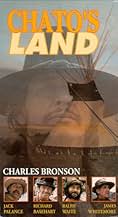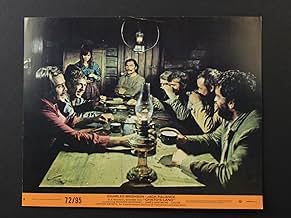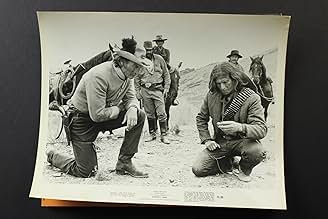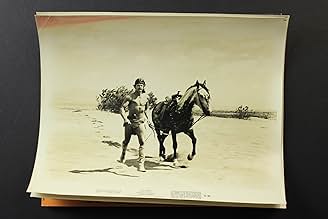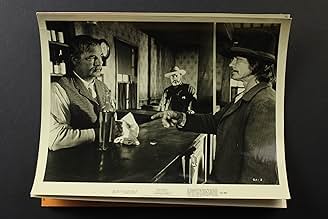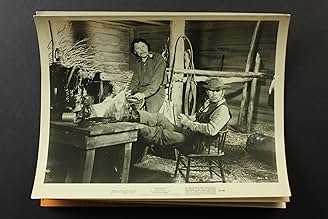IMDb RATING
6.6/10
6.9K
YOUR RATING
In 1870s New Mexico, a half-breed kills a bigoted sheriff in self-defense but the posse that eventually hunts him finds itself in dangerous territory.In 1870s New Mexico, a half-breed kills a bigoted sheriff in self-defense but the posse that eventually hunts him finds itself in dangerous territory.In 1870s New Mexico, a half-breed kills a bigoted sheriff in self-defense but the posse that eventually hunts him finds itself in dangerous territory.
- Director
- Writer
- All cast & crew
- Production, box office & more at IMDbPro
Featured reviews
Charles Bronson plays Chato a half-breed(as they used to say) Apache/White, who finds himself a hunted man when he kills a racist sheriff in a saloon. Despite it being an obvious case of self defense, the townspeople form a posse led by former confederate Quincey Whitmore(Jack Palance, well cast) who seems excited about being in a leadership position again. They pursue Chato into his territory in the mountains, only to discover that they have vastly underestimated him, and that he is determined to get rid of them in any way he can...
Charles Bronson is not given much dialogue here, but is in amazingly good shape, as he is seen shirtless for the film's duration. The posse are shown to be either ignorant and hateful, or just in over their heads. Sympathy is clearly for Chato, who was wronged, but is also quite ruthless himself(justified though.) Allegorical to Vietnam in the sense of a group of Americans thinking their quarry an ignorant savage, but learn that it was foolhardy to pursue him on his own ground.
Though quite grim, it is realistic; Bronson has incredible screen presence, and director Michael Winner presents this story in taut fashion, with a striking ending.
Charles Bronson is not given much dialogue here, but is in amazingly good shape, as he is seen shirtless for the film's duration. The posse are shown to be either ignorant and hateful, or just in over their heads. Sympathy is clearly for Chato, who was wronged, but is also quite ruthless himself(justified though.) Allegorical to Vietnam in the sense of a group of Americans thinking their quarry an ignorant savage, but learn that it was foolhardy to pursue him on his own ground.
Though quite grim, it is realistic; Bronson has incredible screen presence, and director Michael Winner presents this story in taut fashion, with a striking ending.
There's a little in-joke that's included in Pardon Chato's (Charles Bronson) only line spoken in English; and that occurs in about the second minute of this savagely entertaining story about vigilantism running amok somewhere in the Old West.
We see Chato, at the saloon bar, waiting to get his whiskey when in comes the local Marshall Endersby (Jacob Meade), looking to kill himself an uppity mestizo. So, here's the in-joke: just before the Marshall draws to shoot, Chato says: "Back off, lawman!" Then he spins quickly, shooting from the hip to kill the Marshall. It's a joke, because the director, Michael Winner, in 1971, had already filmed a story called Lawman (by the same screen writer, Gerald Wilson) in which a Marshall hunts down a group of men – relentlessly, mercilessly and legally. (Note that Lawman is more highly regarded, at IMDb, than Chato's Land.)
Anyway, the story of Chato is double joke: here, the Marshall is out of the picture (no pun intended) immediately, and the hunters – the Posse Commitatus, a mixed bunch of misfits headed up by either ex-Captain Whitmore (Jack Palance) or Jubal Hooker (Simon Oakland), depending on how the plot unfolds – become the hunted when Chato begins the task of killing them – relentlessly, mercilessly...but, illegally, in this story. Oh, Chato has the moral high ground, many would argue; but, objectively, any court would find him guilty of manslaughter at the very least. And, man, what a slaughter it is! But, this is the Old West, where just about anything goes.
The story has many antecedents (about which Winner and Wilson would have been well aware): The Bravados (1958) with Gregory Peck as the hunter; Hombre (1967) with Paul Newman as the despised mestizo; and Valdez is Coming (1971) with Burt Lancaster as the hunter, and a Mexican to boot. You could probably add to that list. This film adds to it, of course, as being just another take on the good, ol' American pastime of vigilantes racing off to git themselves a hangin' afore nightfall, if possible. In that regard and if you have seen it, you shouldn't miss watching the heartbreak in The Oxbow Incident (1943) with Henry Fonda, heading up an all-star cast, who tries to stop the west's favorite method of dispensing rough justice.
The best part about Chato's Land is the land: the stark, unforgiving country that Chato uses to his advantage. Winner makes good use of long, wide angle shots to emphasize the harsh, bleak landscape; but, his studied close-ups of the characters are often almost works of art. Of the cinematography, I can only complain of the lighting – a good lot of the shoot was completed in pseudo-darkness, using blue filters, no doubt, and was quite annoying at times. Editing is up to par, though, and Jerry Fielding's music is suitably moody – although, I could have done without the military-type snippets.
After speaking that one English line, Chato sticks to Apache, or is silent throughout, as he gets on with his task. So, it's nice to see a man happy in his work, and who doesn't bother us with useless talk.
Highly recommended for all fans of Bronson and Palance.
We see Chato, at the saloon bar, waiting to get his whiskey when in comes the local Marshall Endersby (Jacob Meade), looking to kill himself an uppity mestizo. So, here's the in-joke: just before the Marshall draws to shoot, Chato says: "Back off, lawman!" Then he spins quickly, shooting from the hip to kill the Marshall. It's a joke, because the director, Michael Winner, in 1971, had already filmed a story called Lawman (by the same screen writer, Gerald Wilson) in which a Marshall hunts down a group of men – relentlessly, mercilessly and legally. (Note that Lawman is more highly regarded, at IMDb, than Chato's Land.)
Anyway, the story of Chato is double joke: here, the Marshall is out of the picture (no pun intended) immediately, and the hunters – the Posse Commitatus, a mixed bunch of misfits headed up by either ex-Captain Whitmore (Jack Palance) or Jubal Hooker (Simon Oakland), depending on how the plot unfolds – become the hunted when Chato begins the task of killing them – relentlessly, mercilessly...but, illegally, in this story. Oh, Chato has the moral high ground, many would argue; but, objectively, any court would find him guilty of manslaughter at the very least. And, man, what a slaughter it is! But, this is the Old West, where just about anything goes.
The story has many antecedents (about which Winner and Wilson would have been well aware): The Bravados (1958) with Gregory Peck as the hunter; Hombre (1967) with Paul Newman as the despised mestizo; and Valdez is Coming (1971) with Burt Lancaster as the hunter, and a Mexican to boot. You could probably add to that list. This film adds to it, of course, as being just another take on the good, ol' American pastime of vigilantes racing off to git themselves a hangin' afore nightfall, if possible. In that regard and if you have seen it, you shouldn't miss watching the heartbreak in The Oxbow Incident (1943) with Henry Fonda, heading up an all-star cast, who tries to stop the west's favorite method of dispensing rough justice.
The best part about Chato's Land is the land: the stark, unforgiving country that Chato uses to his advantage. Winner makes good use of long, wide angle shots to emphasize the harsh, bleak landscape; but, his studied close-ups of the characters are often almost works of art. Of the cinematography, I can only complain of the lighting – a good lot of the shoot was completed in pseudo-darkness, using blue filters, no doubt, and was quite annoying at times. Editing is up to par, though, and Jerry Fielding's music is suitably moody – although, I could have done without the military-type snippets.
After speaking that one English line, Chato sticks to Apache, or is silent throughout, as he gets on with his task. So, it's nice to see a man happy in his work, and who doesn't bother us with useless talk.
Highly recommended for all fans of Bronson and Palance.
Charles Bronson and director Michael Winner made the first of several films together in this western that was shot in Spain. Chato's Land boasts a fine cast of players most of whom don't make it through the end of the film.
Bronson plays Pardon Chato a mixed blood Apache just in town for supplies and a racist U.S. Marshal puts the prod to him. That's a big mistake as Bronson kills him in self defense. A bunch of self righteous citizens get up a posse after him. Their brand of justice includes raping his wife and killing his child in the bargain.
Jack Palance plays the nominal leader of the group, but he's got no control over the meanest of the bunch, a trio of brothers Simon Oakland, Ralph Waite, and Richard Jordan. Others in the party include James Whitmore and Richard Basehart.
Charles Bronson is always a nasty man to cross, never more so when on his own turf as he is in the Arizona desert. Bronson has honed this character to perfection. It's no accident that Winner was the director in the first three Death Wish films. Elements of this same plot are also to be found in a particular favorite Bronson film of mine, Mr. Majestyk.
Chato's Land is a good western with an impeccable cast. I do so love that sudden death ending in this film.
Bronson plays Pardon Chato a mixed blood Apache just in town for supplies and a racist U.S. Marshal puts the prod to him. That's a big mistake as Bronson kills him in self defense. A bunch of self righteous citizens get up a posse after him. Their brand of justice includes raping his wife and killing his child in the bargain.
Jack Palance plays the nominal leader of the group, but he's got no control over the meanest of the bunch, a trio of brothers Simon Oakland, Ralph Waite, and Richard Jordan. Others in the party include James Whitmore and Richard Basehart.
Charles Bronson is always a nasty man to cross, never more so when on his own turf as he is in the Arizona desert. Bronson has honed this character to perfection. It's no accident that Winner was the director in the first three Death Wish films. Elements of this same plot are also to be found in a particular favorite Bronson film of mine, Mr. Majestyk.
Chato's Land is a good western with an impeccable cast. I do so love that sudden death ending in this film.
Once again this movie review sight has given a superb movie a lousy rating, and once again I blame the morons that write these reviews. Clearly the coming of brain transplant surgery will be none to soon. This movie is what westerns are supposed to be like, gritty, tough, sweaty, with no holds barred and plenty of action and blood. The plot is simple but works well and does not treat you as if you're a dummy, everything that happens makes sense. Bronson definitely looks and acts like he is an Indian living off the land, he does a superb job and I defy anyone to think of another actor who could play this role. The ending while immensely satisfying also leaves you feeling quite empty as the hero may have won, but why did it have to happen in the first place. Hatred, discrimination and overconfidence were the root causes which drove the posse to chase this fugitive into country he called his own, and in the end they paid for it with their own blood. So I guess you could say this movie also makes you think a little as it does have a moral to the story, which most of the new movies do not.
Michael Winner's "Chato's Land" of 1972 starring the great late Charles Bronson and the equally grand Jack Palance, who also passed away recently, is a tough-minded and violent English Western which should not be missed, and a must-see for every Bronson fan. Director Winner, who is most famous for his violent 1974 cult classic "Death Wish", is certainly one of the masters of uncompromising revenge cinema and "Chato's Land", Winners first collaboration with Bronson, is one of the movies which have rightly earned him this reputation.
When half-breed Apache Pardon Chato (Bronson) shoots a racist Sheriff in self defense in a Saloon, local men form a posse to catch him, in order to hang him as soon as possible. The posse is lead by former Confederate Captain Quincy Whitmore, who is more keen on the manhunt just for the good old times than out of hate towards Chato. The sadistic Hooker brothers who have also joined the posse, however, hate Indians of any kind, and they don't have the slightest scruples of doing anything to make the fugitive pay for defending himself. As the posse members get deeper and deeper into the desert of Indian territory, however, they have to find out that they might have underestimated their opponent. This is Chato's land, and in Chato's land the hunters can quickly become the hunted...
The acting in "Chato's Land" is great, Charles Bronson, who hardly says a word fits perfectly into his role. Jack Palance is superb in his role of Capt. Quincy Whitmore, and I couldn't imagine anybody else but Bronson and Palance to play the leading parts in this. Simon Oakland and Richard Johnson are also great in their ugly roles of Jubal Hooker and his psychopathic little brother Earl, and the cast furthermore contains Richard Basehart. The film is very well photographed in the Spanish Almería, certainly the best location for European Westerns.
"Chato's Land" is a brutal, tough-minded and great Western, which should not be missed by anybody who likes revenge movies. The performances are excellent, and the movie is stunning, raw and atmospheric from the beginning to the end. A must-see for Charles Bronson fans, Chato's Land is a great film. Highly recommended.
When half-breed Apache Pardon Chato (Bronson) shoots a racist Sheriff in self defense in a Saloon, local men form a posse to catch him, in order to hang him as soon as possible. The posse is lead by former Confederate Captain Quincy Whitmore, who is more keen on the manhunt just for the good old times than out of hate towards Chato. The sadistic Hooker brothers who have also joined the posse, however, hate Indians of any kind, and they don't have the slightest scruples of doing anything to make the fugitive pay for defending himself. As the posse members get deeper and deeper into the desert of Indian territory, however, they have to find out that they might have underestimated their opponent. This is Chato's land, and in Chato's land the hunters can quickly become the hunted...
The acting in "Chato's Land" is great, Charles Bronson, who hardly says a word fits perfectly into his role. Jack Palance is superb in his role of Capt. Quincy Whitmore, and I couldn't imagine anybody else but Bronson and Palance to play the leading parts in this. Simon Oakland and Richard Johnson are also great in their ugly roles of Jubal Hooker and his psychopathic little brother Earl, and the cast furthermore contains Richard Basehart. The film is very well photographed in the Spanish Almería, certainly the best location for European Westerns.
"Chato's Land" is a brutal, tough-minded and great Western, which should not be missed by anybody who likes revenge movies. The performances are excellent, and the movie is stunning, raw and atmospheric from the beginning to the end. A must-see for Charles Bronson fans, Chato's Land is a great film. Highly recommended.
Did you know
- TriviaCharles Bronson refused to play in the scene where he saves a naked woman. He refused because she was without clothes. Director Michael Winner eventually used a trick to make the scene without Bronson's agreement.
- GoofsSeveral times as the posse rides through the desert, the saguaro cacti props in the background can be seen jiggling and flapping their arms in the wind.
- Quotes
Capt. Quincey Whitmore: Apaches don't leave tracks unless they got a reason.
- Crazy creditsThere are no closing credits or an end title--merely a simple cut to black.
- Alternate versionsThe original UK cinema version was cut for violence and the later Warner video received 41 secs of cuts to horsefalls and the rape scene, though the print used was missing the shooting of the burning Indian and a shot of Jubal Hooker's face being hit with a rock. In 2004 most of the cuts were waived with only 14 seconds now missing to remove sight of horses being made to fall in a fashion that is prohibited under BBFC Policy and also by the Cinematograph (Animals) Act of 1937.
- ConnectionsFeatured in Kain's Quest: Rambo: First Blood Part II (2018)
Details
- Release date
- Country of origin
- Official site
- Languages
- Also known as
- Renegado vengador
- Filming locations
- Production company
- See more company credits at IMDbPro
Box office
- Gross US & Canada
- $421,031
Contribute to this page
Suggest an edit or add missing content


